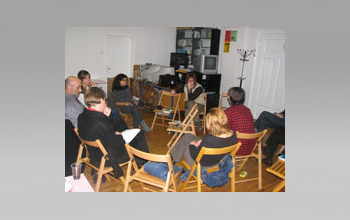WORLD OF ART
Laboratorium of Curatorial Practices
Season 12: 2008/09
Symposium on the State of Curatorial Practices in Armenia, Kazakhstan, Egypt and Turkey
November 6th, 2008
Project Room SCCA, Metelkova 6, Ljubljana
LECTURES
17.00 – 17.20
Nazareth Karoyan (Aica-Armenia, Yerevan, ARM):
The current condition of the contemporary art scene in Armenia and the state of curatorial practices
In his paper Karoyan will present the transition which took place on the contemporary Armenian art scene at the end of 1990s and the beginning of 2000s. Particularly, he will address the ways in which artistic practices (performances, installations) articulating a reaction against the Soviet collectivist ideology and its iconography through referring to the dominant discourses of the body and the space in the 1990s, have now turned towards new-media based practices (video and digital photography) and the discourses of historical time and memory. He will also present the transformations and displacements which took place in the field of curatorial practices that go hand-in hand with the above mentioned paradigm shifts. At the end, he will briefly discuss the goals and objectives of the curatorial summer school in the context set up during the first part of my talk.
17.30 – 17.50
Valeria Ibraeva (Soros Centre for Contemporary Art – Almaty, KAZ):
The current condition of the contemporary art scene in Kazakhstan and the state of curatorial practices
Ibraeva will present the project “Destination Asia”, which is a collaboration of Central Asian, Indian and Pakistani artists and theoreticians taking place during the last two years. Idea of project was to research the gap between two geographically closed regions, conditioned by 17th-18th centuries Muslim fundamentalist regimes of Bukhara, Kokand and Khiva’s emirates, than by the politics of the great game between British and Russian empires and later by the Soviet iron curtain. Given this historical context, first exhibition by Indian and Pakistani artists in Almaty had a title “Non-strict correspondence”, while the Central Asian exhibition in Mumbai was called “Flying over Stereotypes”. During the collaboration all of the participants gained an understanding of “Eastern Orientalist” direction in our art and theory. In the third part of the project the theoreticians from the participating countries as well as Japan, Italy and Germany, tried to understand the transformation of the Western idea of orientalism into an Eastern one, and different ways through which of Western cultural projects are being adopted in Asia. The forth part of the project is the publication of all the materials collected in the book “Destination Asia”.
18.00 – 18.20
Laura Carderera (Townhouse Gallery of contemporary art, Cairo, EGY):
The current condition of the contemporary art scene in Egypt and the state of curatorial practices
Following a brief introduction to the Egyptian contemporary art scene and a presentation of the Townhouse Gallery of contemporary art in Cairo, Laura Carderera will address the current state of curatorial practices and education in Egypt, while sharing her experience as the program manager of the curatorial program conducted at the Townhouse Gallery in 2008. The first in Egypt and in the Middle East, the Townhouse curatorial program was born out of the need to address the lack of training opportunities and the absence of any permanent course of curatorial practice or arts management in the region.
18.30 – 18.50
Renata Papsch (DEPO, Istanbul, TUR):
The current condition of the contemporary art scene in Turkey and the state of curatorial practices
Renata Papsch will start with some general remarks about the contemporary art scene in Turkey, and then describe the different players, such as museums, galleries, cultural centers and artist-run spaces. The questions I will address include: What is the role of IKSV and the Istanbul Biennial in the art scene? What are the plans of Istanbul European Capital of Culture 2010? What are the government and the municipalities doing for the contemporary art? How is the funding situation (public / private, support by international organisations)? She will also talk briefly about the education (universities / training) and the media, and will finish her presentation with discussing the state of curatorial practices in Turkey.
19.00 – 19.30
Short coffee break
19.30 – 21.00
Round table on curatorial practices and their education
Participants: Laura Carderera, Nazareth Karoyan, Valeria Ibraeva, Renata Papsch
Discussants: Barbara Borčić (SCCA-Ljubljana, SVN), Angela Harutyunyan (Aica Armenia, ARM)
Moderator: Petja Grafenauer Krnc (SCCA-Ljubljana, SVN)
PARTICIPANTS
 Nazareth Karoyan
Nazareth Karoyan
Born in 1959, in Yerevan, lives in Yerevan. Art Critic, free lance curator, president of AICA- Armenia, co-organiser of the Summer School for young art curators.
From 1982 to1992, he was in charge of communication in Yerevan Museum of Modern art. From 1990-1993, he taught history of art at P. Terlemezian Fine Art College. In 1991 Karoyan opened Goyak, one of the first private art galleries in independent Armenia which he directed until 1993. In 1994, he opened the second art gallery, Ex-Voto. From 1997-2000, Karoyan founded the art magazine In Vitro. Since 1989 he organized about fifteen collective and solo exhibitions, amongst which the most important were: Armenian Postmodernism, (1992 Goyak Gallery, Central House of Artist, Moscow), Beyond idiom- Subjective Integration, (1993, American University of Armenia, Yerevan), Yerevan Landscape, (1994, Ex-Voto Gallery at Russian Museum of art, Yerevan), Beyond Icons: Contemporary art in Armenia: (2001, National Art Gallery of Armenia), The Environment of the body…Genetically Modifiable (2003, Utopiana, Museum – National Institute of architecture of Armenia). D’Arménie… (2007, Le Quartier, Contemporaray Art Center in Quimper, France). In his texts, articles and conferences Karoyan examines the becoming of the system of art, the articulation of the socio-political context in the contemporary art of Armenia and artistic issues of communication between post- Soviet Armenia and Europe.
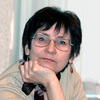 Valeria Ibraeva
Valeria Ibraeva
Art theoretician, art critic, curator, director of the Soros Center for Contemporary Art-Almaty. Her research is dedicated to the relationships between art and politics, changes within the Central Asian culture in the context the newly emerging international processes. Major publications are: “Die Kunst Kasachstans als politisches Projekt” in the book: Zuruck.aus der Zukunft, Suhrkamp Verlag Frankfurt am Main, 2005; “Sto godina samoce” ? ?. Radionica, ? 2, Zagreb, 2002; “Vater und Sohne. Zwei generation neuer Kunstler in Kasachstan” in dygest Abseits der Seidenstrasse, Berlin, 2002; “Waiting for Godoh”, in the catalogue A Contemporary Archive: Central Asia on the 51th Venice Biennale, Bishkek, 2005
Curated major exhibitions include No Mad’s Land, House of the World Cultures, Berlin, 2002; TransForma, Center for Contemporary Art -Geneva, 2002; People and Shadows, CANAIA Gallery, Mexico-city, Mexico, 2004; Tamerlan Syndrom, City Exhibition Hall, Orvieto, Italy, 2005. Valeria Ibraeva was the manager and curator of the two-year international projects Videoidentity: The Sacred Places of Central Asia, Kazakhstan-Tajikistan-Uzbekistan-Kyrgyzstan, 2004-2005 and Destination Asia, Central Asia-India-Pakistan, 2007-2008.
 Laura Carderera
Laura Carderera
Laura Carderera has been working as Program Manager at the Townhouse Gallery of contemporary art since January 2007. Among other projects, she was the coordinator of the first curatorial workshop that took place at the Townhouse in 2007 and she is currently managing a more comprehensive curatorial program in the gallery targeted at emerging curators and arts professionals from the Middle East.
Laura holds an M.A. in Arts Administration from Columbia University, New York, a Master in Law from King’s College London and a Law Degree from the Universidad Complutense in Madrid. Having started her career as a copyright and cultural property lawyer, she went on to pursue a career in arts management. Laura has professional experience in several cultural non-profit organizations, including the World Monuments Fund in London and the Cultural Office of the Spanish Embassy in Washington D.C. Prior to moving to Cairo, she worked for a year as the Director of Museum and Contributor Relations of Scholars Resource, one of the leading providers of digital art images for educational purposes in the United States.
 Renata Papsch
Renata Papsch
Renata Papsch is a cultural manager from Austria, who has initiated and managed cultural projects in different countries, especially around the Mediterranean. At the moment, she is the director of DEPO, a new cultural centre in Istanbul which aims to facilitate artistic collaboration and cultural exchange between Turkey, the South Caucasus, the Middle Eastern and the Balkan countries. Before that, she was working with SantralIstanbul, a newly established university and cultural complex, initiated by Istanbul Bilgi University. Her experience includes coordination of projects in Arab countries, management of grant programs and administration of an international network for contemporary performing arts (IETM). For many years, she has been working as a consultant for different cultural organisations in several countries.
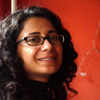 Angela Harutyunyan
Angela Harutyunyan
Angela Harutyunyan is a PhD candidate in Art History and Visual Studies at the University of Manchester. She is currently writing a dissertation on contemporary Armenian art and the post-Socialist public sphere under Dr. Amelia Jone’s supervision. She is a member of AICA and the co-organizer of the annual international summer seminars’ program for contemporary art curators. She curated several solo and group exhibitions of contemporary Armenian art, including the International media art festival Public Media Space at the Armenian Center for Contemporary Experimental Art (ACCEA) in Yerevan, 2004 and Coming to You Not To Be With You, WOW, 2008. She has published several scholarly articles on various topics related to the contemporary art scene in Armenia within the broader context of post-socialist art and culture. She is the co-editor of Public Spheres After Socialism (Intellect Books, 2008). Her research interests include issues of art historiography, performance and body art, artistic practices related to the problems of memory and forgetting, queer studies as well as aesthetic and politics.
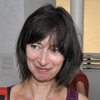 Barbara Borčić
Barbara Borčić
Graduated with B.A. in art history and English from Ljubljana Faculty of Arts. Since 2000 she has been director of SCCA-Ljubljana, Center for Contemporary Arts. She has been active in the field of contemporary arts as a free-lance curator, publicist and editor. In 2005 she received the Izidor Cankar award. In the frame of SCCA, Borčić is a director of the Videodokument. Video Art in Slovenia 1969-1998, Videospotting, Internet Portfolio, DIVA projects and co-editor of Žepna book series and PlatformaSCCA publications.
She was the artistic director of Škuc Gallery (1982-1985), collaborator of the Studia humanitatis publishing house (1986 – 1993), editor-in-chief of the fine arts magazine Art Words (1991-1992); since 1993 she is employed at Soros Center for Contemporary Arts – Ljubljana as an assistant to the director and its director (1997-1999).
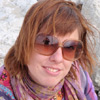 Petja Grafenauer Krnc
Petja Grafenauer Krnc
An independent visual art critic and curator. She is completing her PhD on Historical Anthropologies of Visual at the ISH – Ljubljana Graduate School of the Humanities and her undergraduate studies in Comparative Literature and Literary Theory at the Faculty of Arts Ljubljana.
She publishes regularly in the newspaper Dnevnik and on Radio Študent Ljubljana where she was the editor of Culture and Humanities Editorial between 2006 and 2007. As a curator she is cooperating with Ganes Pratt Gallery Ljubljana.
